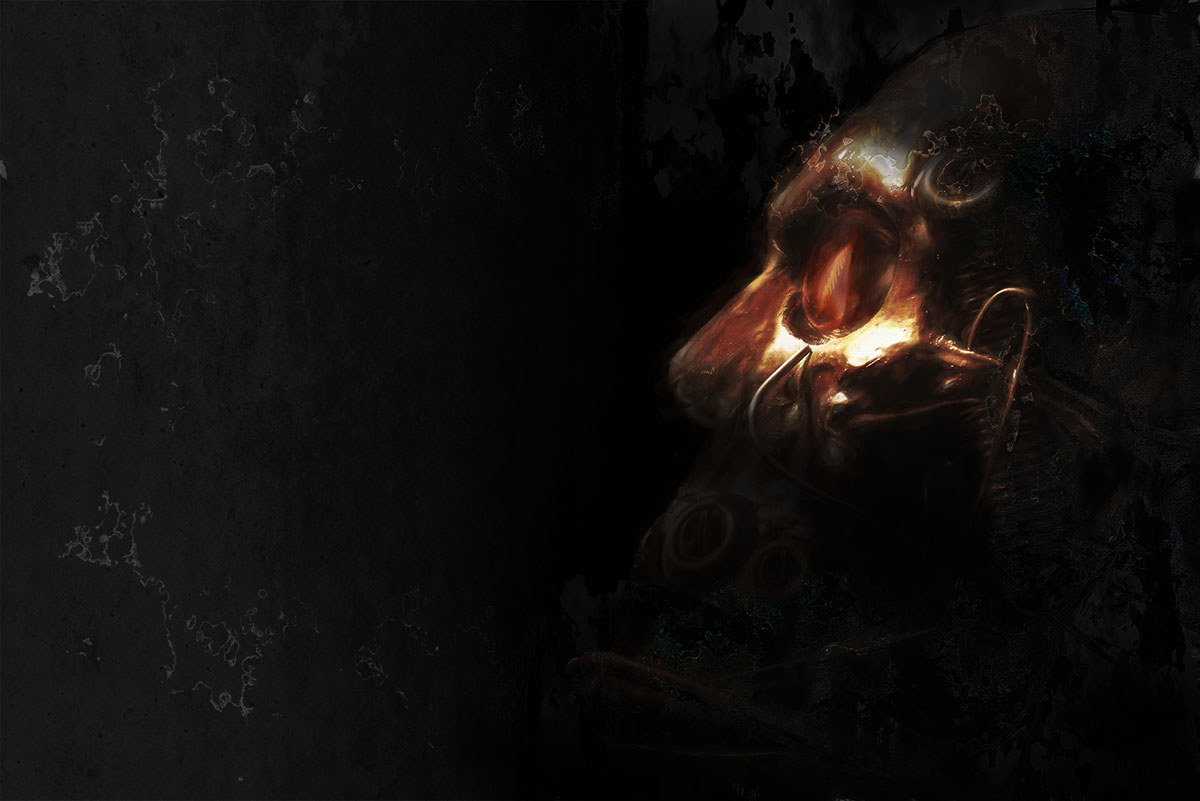 |
The Clockwork Heart
By Kat Heckenbach
The automaton had served me well, but I refused to feel remorse about decommissioning him.
It
, not
him
. Automatons are things, not people. Everyone knows that. Everyone
insists
. And Oscar was no exception. He— I mean
it
was metal and gears, nuts and bolts, springs and wires, nothing more. I would not lose a single night's sleep over this.
The screw I'd been turning broke free of its hole and landed on the worktable with a soft
tink
. I lifted the corroded and warped plate covering the center of Oscar's chest and set it aside. Light from the sconces above the table reflected and shadowed the peaks and valleys of Oscar's form, amplifying the tarnished appearance and highlighting the numerous dents and scratches. The rest of the workshop remained in moonlit dimness.
Just a thing. I'd built...
it
myself. Designed every feature, carefully placed every part down to the last rivet. I'd given Oscar eyes that could rotate, a hinged jaw, jointed fingers and opposable thumbs, but no one in their right mind could mistake him for human. No skin, no flesh of any kind. Brass plating. Glowing lights. Metal that creaked and clanged with every movement when I failed to keep it oiled properly, and then even with constant oiling— until movement became nearly impossible because of corrosion and other damage. It was imperative the body be obviously mechanical. Machines must be inferior to humans. They have their place. Nothing more than tools.
I had, however, put particular care into Oscar's heart.
Other than the materials from which it was made, every detail mimicked a human heart. The shape, the size, even wires running like vessels along the surface. It served no true function for Oscar, merely providing the sound of a heartbeat. A sound muffled to all but the most attuned ears, such as my own. A sound soft enough that no one heard, because no one would come close enough to Oscar to hear.
A sound that continued even after shutting Oscar down, as it ran on a separate, internal power supply. My own invention. And as long as it stayed inside Oscar, the heart had to remain my secret. On its own, it was a machine. Ghastly in others' eyes, perhaps, but lifeless. Within Oscar, it crossed a line.
I reached out and gently touched the heart, running my fingertips along the metal terrain. I could feel the vibration of the tick-tick-ticking that emanated from inside. Oscar's body lay still, eyes now dark glass domes. Absolute quiet other than the clock-beat of the heart.
The turning of several nuts, the sliding of their companion bolts, and the heart detached from inside Oscar's chest cavity. I slipped my fingers down along each side and lifted, then cradled the ticking heart against my own.
With a deep breath, I slid my thumb across the tiny lever hidden beneath the aortic arch.
Now the silence was absolute.
I turned toward the fireplace on the wall to my right. A velvet pillow sat on the mantle, blood-red and trimmed in black. I stepped over and stood in front of the mantle, then nestled Oscar's heart on its new bed. Tomorrow I would disassemble the rest of Oscar's body, repurposing the metal that could be salvaged and scrapping the rest. From then on, I would no longer worry; I would receive no more scathing glances because of my creation.
Tonight, though, sleep.
"Good night, Oscar," I said to the heart. With a sigh, I moved on to bed.
In the morning, I went about my day. A trip to the market and the hardware store. A stroll along the river. Walking alone, without Oscar's creaking and metallic steps beside me, I focused on the sights and sounds. I nodded greetings to surprised faces that momentarily darkened with recognition, then lit with relief upon noticing the absence of the machine-man.
The friendly waves of gloved hands. Curious smiles. Even a cheery "hullo" now and then. They lightened my steps along the cobbled streets and eased my breaths.
The museum appeared on my right— a new exhibit had opened and I decided at the last minute that viewing some art would do me some good. Oscar could wait. The automaton was just a pile of metal that could be disassembled at any time. Today there were more important things to do, and for the first time I could truly do anything I chose.
When I returned home, the sun had long since set. Exhausted, my mind swirling with the day's memories, I rushed straight to bed. Unfortunately, this night turned out no better than the last.
Tick-tick-tick...
It couldn't be. The noise had stopped that morning, the room silent as a graveyard when I'd awoken, and still as silent when I'd returned. I had to be imagining it. Again, I followed the procedure I had the night before. Lighting the candle and then opening the door millimeter by slow millimeter. Shining the light of the candle flame through the sliver and having the air refuse to leave my lungs at the site of the automaton's glass eye.
Once more, the morning brought a multitude of activity, most of which kept me out and about all day— despite not a single sound as I passed the heart and metal body on my way through the workshop. I slipped outside and explored the town in ways I had not for years. Stopped for conversation and exchanged pleasantries with those who before had avoided me.
More nights passed, and more days. Despite the fact that everyone's wariness of me had abated, I spent more time at home. My secret remained, carried inside me like a lead ball. How could it not weigh on me with the constant reminder, night after night?
Tick-tick-tick...
Yet I ignored what lay on the workshop table. I could not bring my hands to touch the still body. The thought of its metal skin against my own brought shivers down my spine. If only I could remove it from my mind completely, the noise would not plague me at night. I could stop rising at midnight, stop cracking the door. I could leave the candle on the nightstand and refuse to watch the ribbon of light flicker as it touched the glass eye.
A week passed. Seven nights of sleeplessness. Seven nights of spying on the automaton's wretched glass eye. Seven nights of feeling as though Oscar spied in return; only I could not see past the glass and Oscar seemed able to peer directly into me. Each night the glass eye flamed brighter, moved closer, as though the distance from my door to the worktable contracted. Could it be the candlelight alone? Or did, as everyone believed, something unholy reside within the lifeless metal form?
On the eighth night I could take it no longer.
Tick-tick-tick...
I lit the candle and stepped to the door. Listened at the wood, then turned the knob. Slowly, slowly, the cold from the metal invading my fingers. Without so much as a click, the door unlatched, and I pushed gently, gently. Millimeter by millimeter, until the crack was just wide enough to peer through. The ribbon of light from the candle fell across the hall and snaked over Oscar's eye, flashing it momentarily to life and stifling my breath.
Tick-tick-tick...
I could not live another night like this.
Swallowing hard, shoving my fear to a dark, secret spot in my mind, I pressed the door open further and further until it stood wide.
Oscar did not move, but the candlelight rolled across his metallic shell like an ocean wave, creating reflections like scattering minnows. It was time.
I dashed forward and set the candle on the end of the table. In a frenzy, with trembling hands and sweat dripping from my burning brow, I grabbed all I'd need to disassemble the automaton and set to work. The tin snips in my hand cut into the metal with a crunch that urged me forward, and piece by piece, the pile of scrap grew…
I awoke to glorious silence, and to a calmness in my soul I had begun to believe I would never regain. No longer would that eye haunt me— I had rid myself of that worry for good.
Stepping past the end of the hallway, I smiled at the empty worktable.
"What a wonderful day," I exclaimed.
"Yes, it is."
I spun at the sound of Oscar's voice, my grin widening. His metal sheeting gleamed from the polishing I'd given it. I'd had to replace several pieces that were beyond repair, and the finish didn't quite match, but it merely gave Oscar more character. He moved smoothly, no creaks or clangs. The bulbs behind the glass domes of his eyes shone bright yellow; but it was the yellow of morning sunshine, not the frightening glint of midnight candlelight.
I glanced over at the empty pillow on the mantle, and then turned my gaze to Oscar's chest. Holding my breath, I listened, and exhaled when the lovely
tick-tick-ticking
met my ears.
Oscar followed my gaze, looking down at his chest, and placed his hand over his heart.
I stepped forward, and gripped Oscar's shoulders. He raised his head; we were eye-to-eye.
"It's good to see you, old friend."
|
Subscribe or support us today on Patreon to unlock this feature.
Get a look at the correspondence between author and editor to see how an author responds to story concerns by making a few modest and precisely placed changes that make all the difference in bringing the tale to its highest level of polish.
 |
DreamForge Anvil © 2021 DreamForge Press
The Clockwork Heart © 2021 Kat Heckenbach
